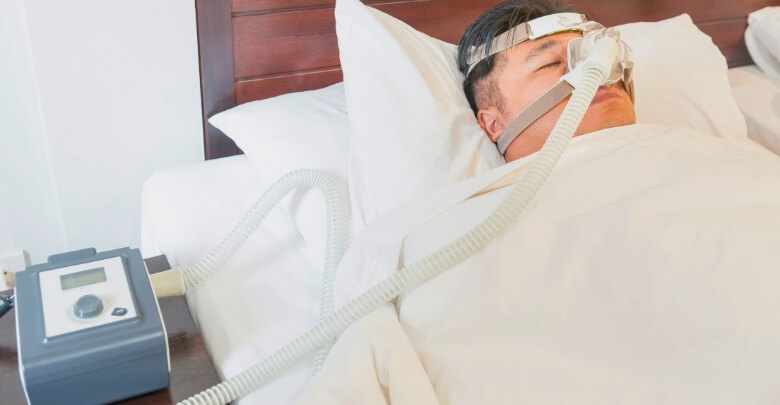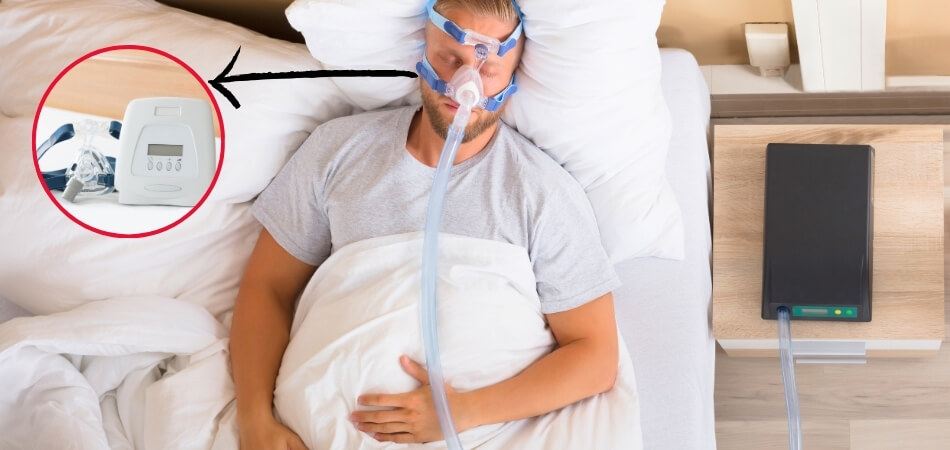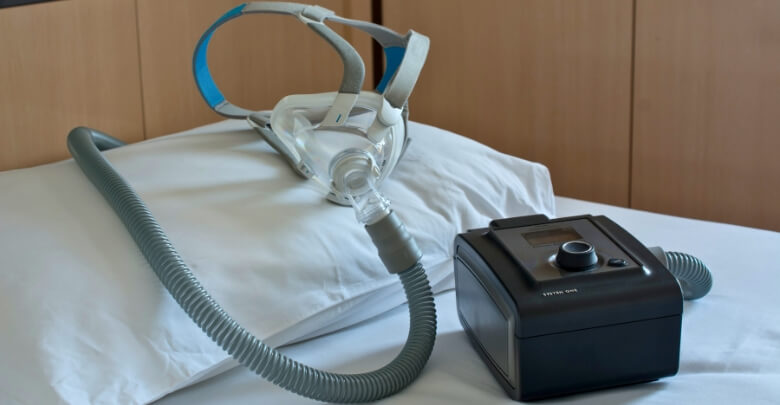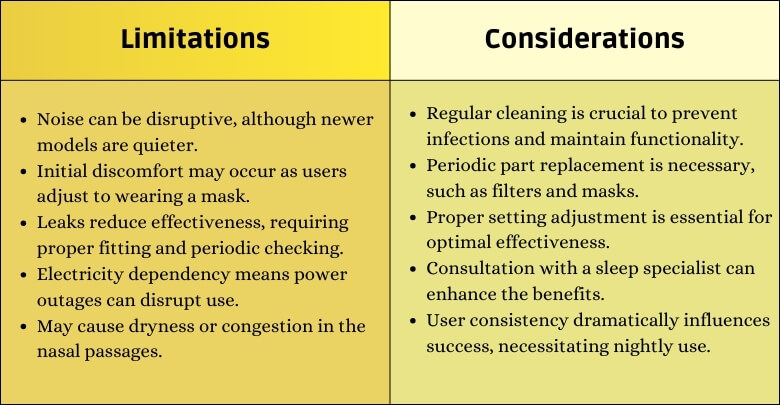The use of CPAP (Continuous Positive Airway Pressure) machines is a staple in the treatment of insomnia, a condition marked by repeated interruptions in breathing during sleep.
A high-pressure air delivery system prevents breathing pauses by keeping the airways open. Beyond airflow, CPAP machines are equipped with sensors that monitor various physiological parameters to ensure treatment effectiveness. Now, you might wonder, “Can a CPAP machine tell if you are asleep?”
Yes, through sensors that track breathing patterns and airflow, these machines can detect signs of sleep, such as reduced muscle activity and changes in breathing rates. This capability allows the machine to adjust pressure levels optimally.
Join us as we explore how this technology enhances sleep quality and overall health.
Sleep Monitoring: Why It’s Important?
Sleep monitoring plays a fundamental role in understanding and improving your overall health. Sleep patterns and issues can affect your ability to function during the day. A sleep apnea diagnosis can have a substantial impact on your cardiovascular health and energy levels.

Accurate sleep tracking helps personalize treatment for sleep-related issues and guides lifestyle changes to enhance sleep quality. For instance, it can prompt you to adjust your bedtime routines or environment to foster better sleep.
Additionally, modern gadgets like the chill pill can help mitigate poor sleep effects by promoting relaxation and improving the sleep environment. This in turn supports the efficacy of therapies and interventions based on your sleep data.
Monitoring your sleep is not just about clocking enough hours; it’s about ensuring those hours are restorative and beneficial to your health and well-being.
Can a CPAP Machine Tell if You are Asleep? Technological Exploration
CPAP machines are widely used to treat sleep apnea, a condition in which breathing stops intermittently during sleep. These devices ensure consistent airflow, preventing breathing pauses and promoting a restful night. You might wonder, “Can a CPAP machine tell if you are asleep?”

Yes, it can. Sleeping patterns and airflow are monitored by advanced sensors in CPAP machines. The machine can adjust its pressure settings to suit the depth and phase of sleep, optimizing therapeutic effects. Here are the key factors.
Sensing Sleep through Breathing Patterns
CPAP machines are equipped with sophisticated sensors that measure your breathing rate and rhythm. As you fall asleep, your breathing rate slows down. The machine detects these changes and interprets them as sleep signs.
This detection is critical for the machine to function effectively. Throughout the night, it adjusts the air pressure accordingly. The sensors also monitor for breathing disruptions, such as sudden stops characteristic of sleep apnea.
By analyzing airflow and respiratory efforts, the machine can discern different sleep stages. This technology ensures that the machine’s response is fine-tuned to the user’s needs.
Health Implications of Sleep Quality
It’s interesting to note how interconnected our health is with sleep quality. Lack of sleep can cause a sore throat, among others, which can affect your day-to-day well-being. A good night’s sleep is essential for our health, emphasizing the importance of a well-calibrated CPAP machine.
Adjusting Pressure Levels
Once the CPAP machine confirms that you are asleep, it adjusts the air pressure to the most effective level for the sleep stage detected. The feature keeps the airway open, especially during deep sleep stages. The pressure adjustment is smooth and responsive, enhancing the treatment’s comfort and effectiveness.
These adjustments are not just about comfort; they are vital for preventing airway collapse, which can lead to sleep disruptions and decreased oxygen levels. The machine’s ability to adapt its output helps ensure uninterrupted sleep, which is essential for overall health.
You can learn about the latest technology in sleep aids and health-related gadgets at Info Gadgetians. A lot of information is provided on the site about the latest gadgets that can enhance your health and lifestyle. There’s a wealth of information available about sleep apnea and sleep technology.
Through these mechanisms, CPAP machines support continuous breathing but also contribute significantly to sleep quality and overall health. It is important to understand how these devices adapt to your sleep patterns.
How CPAP Machines Detect Sleep?
If you’ve ever wondered how a CPAP machine knows when you’re asleep, you’re not alone. They provide uninterrupted breathing at night for those with sleep apnea. Their magic lies in detecting sleep and adjusting airflow to improve sleep quality. Let’s dive into the process by which these smart devices discern sleeping from waking moments.

Step 1: Monitoring Breathing Patterns
CPAP machines start their work by closely monitoring your breathing patterns. When you begin to fall asleep, your breathing rate naturally slows and stabilizes. This change signals the machine that the user has transitioned from wakefulness to sleep.
Step 2: Analyzing Airflow
The machine measures the volume and flow of air in and out of the respiratory system. Variations in these measurements help the CPAP device assess whether you are in a lighter or deeper sleep phase. Accurate airflow analysis is key to determining the precise moment sleep begins.
Step 3: Adjusting Air Pressure
Once sleep is detected, the machine adjusts the air pressure accordingly. This adjustment is vital to prevent apnea events and ensure continuous breathing. Optimal air pressure is maintained throughout the night, adapting as your sleep stages change.
Through these steps, a CPAP machine not only helps manage sleep apnea but also ensures that the treatment is both comfortable and effective. Many people benefit from this technological sophistication, which combines healthcare with smart technology.
Limitations and Considerations: What CPAP Users Should Know?
The CPAP machine has revolutionized the lives of many people with sleep apnea, but they are not without limitations. It’s imperative for users to know these factors to manage their expectations and optimize their use of the device. We’ll examine some of the key points every CPAP user should keep in mind.

Limitations
- Noise can be disruptive, although newer models are quieter.
- Initial discomfort may occur as users adjust to wearing a mask.
- Leaks reduce effectiveness, requiring proper fitting and periodic checking.
- Electricity dependency means power outages can disrupt use.
- May cause dryness or congestion in the nasal passages.
Considerations
- Regular cleaning is crucial to prevent infections and maintain functionality.
- Periodic part replacement is necessary, such as filters and masks.
- Proper setting adjustment is essential for optimal effectiveness.
- Consultation with a sleep specialist can enhance the benefits.
- User consistency dramatically influences success, necessitating nightly use.
CPAP users can deal with any challenges they may face by understanding these limitations. It’s all about finding the right balance and making adjustments as needed to ensure the CPAP machine works effectively. Sleep quality and overall health are improved.
FAQs About Can a CPAP Machine Tell if You are Asleep?
CPAP machines are essential for sleep apnea patients, providing critical support throughout the night. Here are some frequently asked questions to help users understand their functionality better.
Does a CPAP Machine Know When You Stop Breathing?
Yes, your CPAP machine can detect when you stop breathing by measuring changes in oxygen levels and resistance. By adjusting the airflow, it ensures your safety and sleep continuity.
What Happens If a CPAP Machine Turns Off While You Sleep?
If your CPAP machine stops working during the night, you can still breathe room air. It may interrupt your sleep quality if the therapeutic benefits are paused until the machine resumes.
How Does a CPAP Machine Adjust Pressure During Sleep?
To prevent airway blockage, the machine continuously evaluates breathing resistance. This dynamic adjustment helps maintain effective therapy tailored to different sleep stages.
What Should I Do If My CPAP Machine Makes Noise?
Check for air leaks in the mask and hose, as these can cause unusual noise. Ensuring a proper fit and replacing worn-out parts can reduce sound and improve device function.
Is It Safe to Use a CPAP Machine Every Night?
Yes, using CPAP every night is safe and recommended for treating sleep apnea consistently. This can significantly improve your sleep quality and overall health.
How Often Should CPAP Equipment Be Cleaned?
To prevent bacteria buildup, CPAP equipment should be cleaned regularly, ideally daily. This will ensure the device operates effectively. Weekly cleaning of other components is also recommended.
Conclusion
Sensors on CPAP machines monitor breathing patterns and airflow to detect when a user falls asleep. This capability is vital for adjusting air pressure levels optimally for each sleep stage, enhancing treatment effectiveness.
So, Can a CPAP machine tell if you are asleep? Absolutely, and knowing this helps users trust in their device’s ability to provide necessary support throughout the night.
For a smoother experience, users should ensure the mask fits well, maintain the device regularly, and consult with specialists to fine-tune settings as needed, maximizing the benefits of their CPAP therapy.






